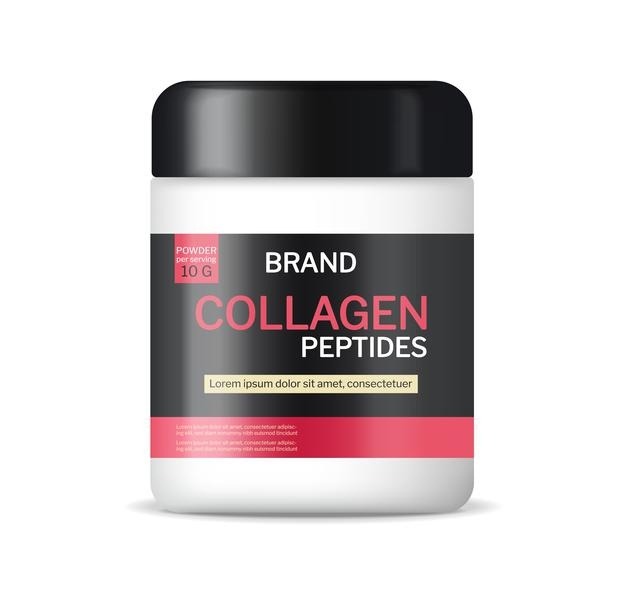Collagen and Aging: Can Supplements Help?
I waited to write this article until I had taken collagen myself. After more than two years of consistently adding a scoop of collagen peptides to my smoothies, liquid vitamins, or to just one of the 64 ounces of water I aim at drinking each day, I can answer this question with a resounding YES.
I am asked this question with some regularity by clients and readers, and since I only recommend what I experience, I needed to do the research, and then try it myself.
Let’s have a look at collagen, the science behind the benefits, and my personal experience so that you can decide for yourself if you want to give it a go.
Collagen Peptide Powder
Collagen peptide powder is fairly inexpensive. I buy it from a reputable health food store. Doing so insures I get the real thing. There are a variety of powdered brands and one type of liquid brand. I use my store’s powdered house brand.
The key is to look for a supplement that has collagen type 1, for sure, as it’s the most important. If it also has type 2 and/or 3 that’s even better. Mine has type 1 and 3.
What is Collagen?
Your short science lesson for today: The word collagen comes from the Greek word meaning glue, and that’s exactly how it acts in our body. Collagen is the most abundant protein in our body. We have, at last count, 19 different types of collagens inside us, and they make up roughly 20% of our body mass.
Collagen is the key building block for all our connective tissues.
The largest is our skin, where collagen helps keep it thick, strong, and well connected to protect our insides. It maintains the integrity of our blood vessels, helps our corneas stay healthy, and aids in keeping our teeth, bones, and joints strong. It makes up our tendons, ligaments, and muscles.
Additionally, collagen acts as vital and protective layer to our organs.
The Science Behind Collagen
Frustratingly, almost all the studies done on collagen are funded by labs that make a collagen product. However, as early as the 1970’s, some small studies began and some are still on-going. Some of these explore how collagen may be beneficial in helping with Alzheimer’s and Parkinson’s diseases and their prevention.
Work by Dr. Juan Mario Garcia-Coronado at Universidad Autonma de Nuevo León, Mexico, found collagen reduced symptoms of osteoarthritis. Scientists are also looking at the ways collagen helps strengthen the lining of our arteries and veins, and how it shores up the protective sheath around our hearts for over-all greater heart health.
In the Carilion School of Medicine at Virginia Tech University, Dr. Michael Fox is studying collagen in relation to its help with seizures and psychiatric disorders. I will keep you posted as more independent studies appear.
Collagen Levels in Perimenopause and Menopause
What happens to our collagen during aging?
Around age 30, our collagen production slows and the various systems made up of collagen—skin, structural and skeletal and organ sheaths—begin to experience breakdown, albeit slower in some cases, faster in others, but the breakdown is happening. This process continues as we age, and accelerates our depletion of the remaining collagen our body naturally produces.
Our collagen levels at menopause and beyond diminish even further, and many of us experience joint issues, cracked or chipped teeth, thinning and easily bruised and torn skin, dry eye, hair loss, and more aching muscles after workouts or strenuous activities.
I was firmly in that camp.
My Experience with Collagen Supplements
Collagen can help us at menopause, as it gives our body extra supplementation of our vital “glue,” to keep our body functioning better as we are losing our protective armor of hormones. I wish I had known that adding additional collagen helps during and after menopause.
At sixty, I experienced almost all of the above issues. I started taking powdered collagen peptides along with my vitamin C, as collagen works most effectively with the help of vit C.
Eyes
After adding a scoop religiously to my liquids, I noticed I was using far fewer moisture eyedrops; in fact an entire expensive box expired, unopened.
Now, two years later, I rarely need medication to help with dry eye—even during allergy season!
Skin and Nails
I also notice my skin is thicker, just like the beauty industry promises and the scientific collagen research shows, and tears less easily when I get within three feet of one of my rose bushes or a sharp cabinet corner. The wrinkles in my skin look smoother, less deep, and I have added fewer new ones.
My nails are harder, and the persistent vertical cracks I had in several toenails drastically improved. The incessant nail peeling stopped completely! Lastly, I feel much less achy after a day of intense gardening.
Hair
The most dramatic result I see, as if those I just listed weren’t enough, is in the marked increase in the thickness of my hair. Like so many women at menopause and beyond, I lost quite a bit of my hair, and while some did grow back, it was never the same. After trying everything legitimate I could find—there are so many dubious products out there—I just accepted thinner hair as reality.
However, after taking the collagen for two years, I, my hairdresser, and several of my friends have noted how much thicker my hair has become. Even after getting the virus last fall, as after an illness we often lose a fair amount of hair, I didn’t lose any.
A few friends have also taken collagen for a while, and they unofficially report improvements in their skin and hair thickness, as well as dry eye relief.
I share with you my personal experience in the hopes that if it feels right to you, you might add collagen to your daily routine. It’s working for me, and if your doctor approves, give it at least six months of consistent use to begin seeing results. Please keep me posted!
Until next time… Be Vibrant!
Living Vibrantly
Like what you see? Subscribe to receive exclusive tips to start living Vibrantly!
Share Your Thoughts…
What is the most important piece of wisdom you have learned as you have grown more wise? Share yours below in the comments—together we can all benefit from your knowledge!

L.J. Rohan is a Gerontologist (University of Southern California’s Davis School of Gerontology), Certified Aging in Place Specialist (CAPS), and Vibrant Aging™ Coach. L.J. is dedicated to redefining the aging process. With a focus on holistic well-being, she combines scientific research and practical insights to guide women age 55+ towards a vibrant, fulfilling life. Her work has been featured in numerous publications and she frequently speaks at institutions such as Yale University and Southern Methodis University. Be Vibrant!

